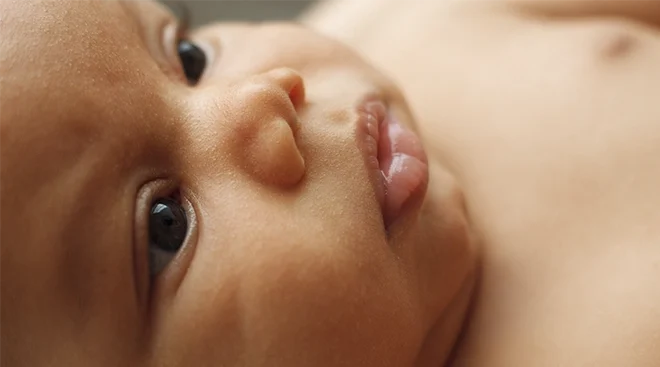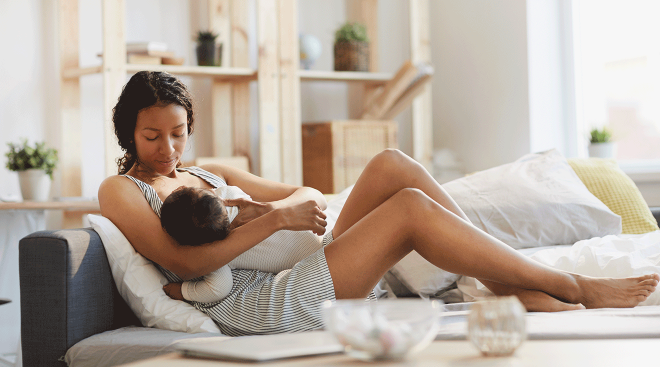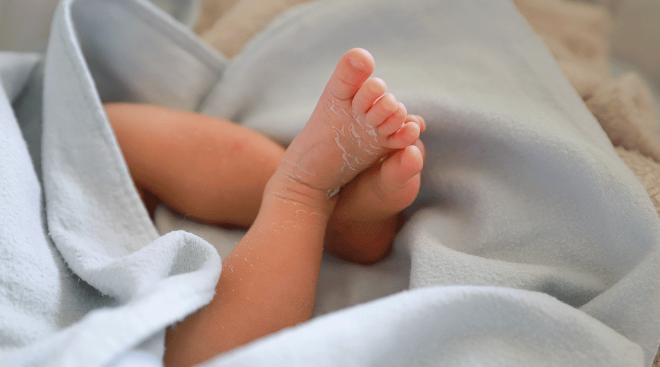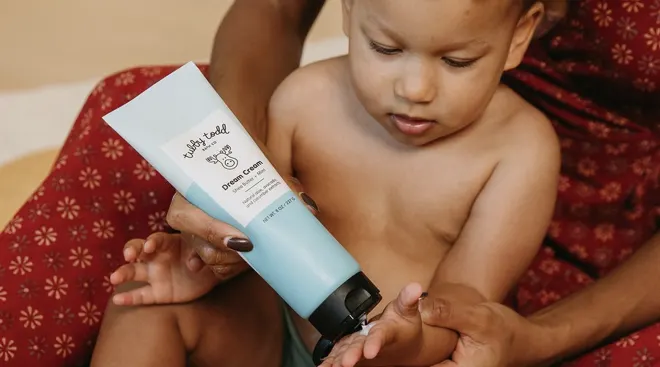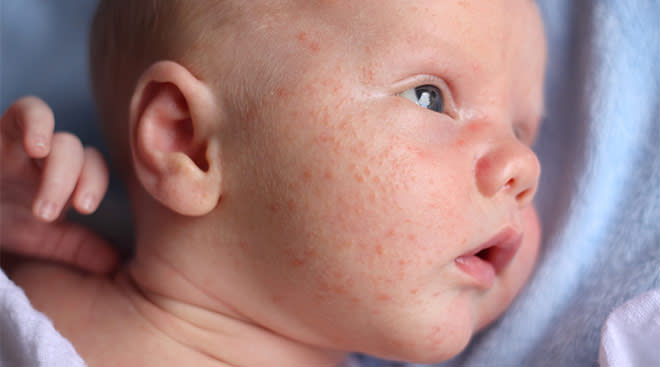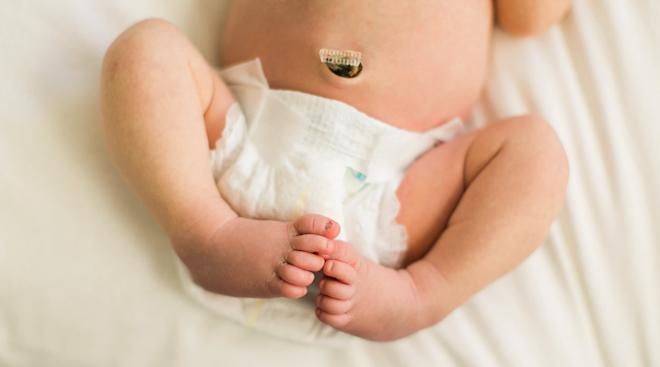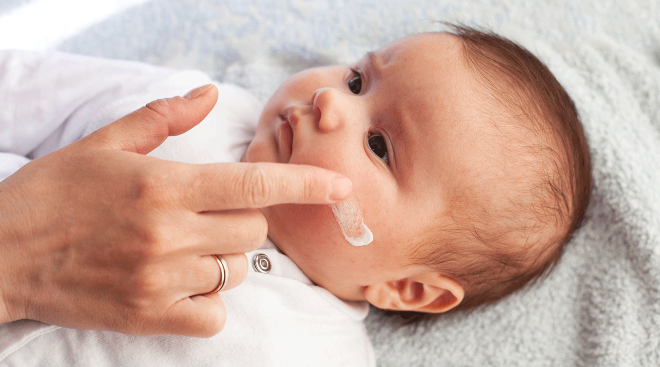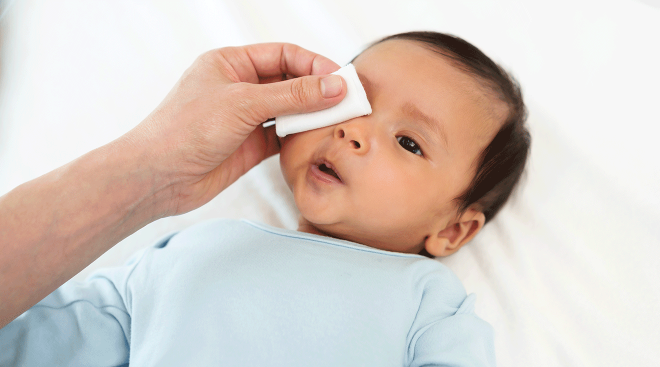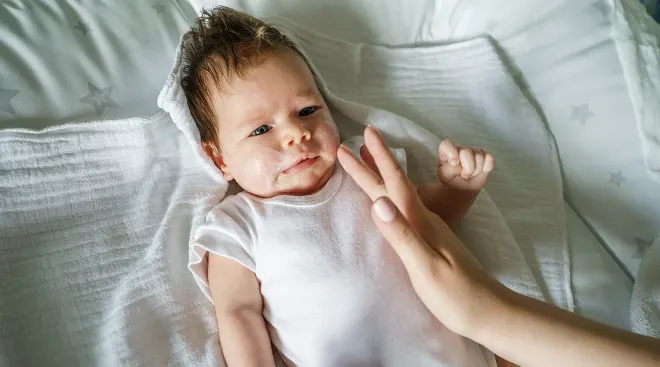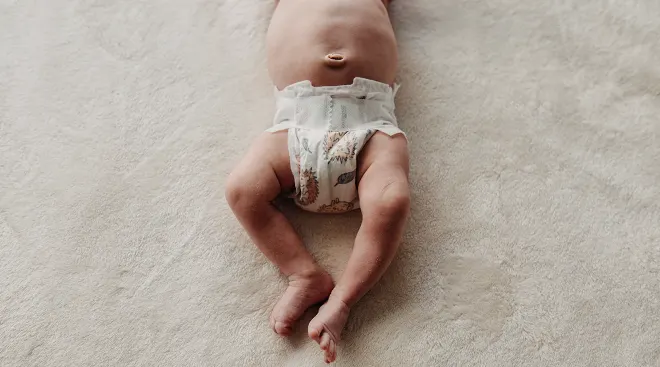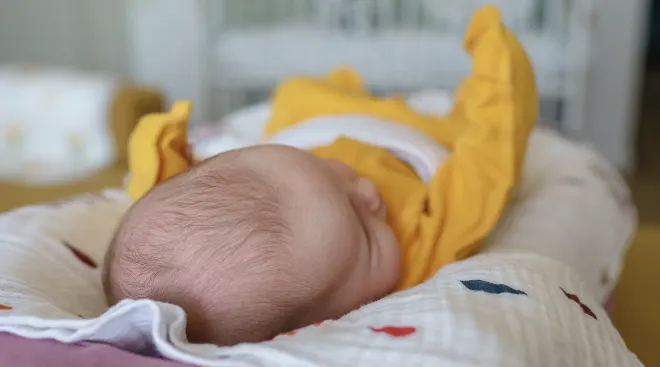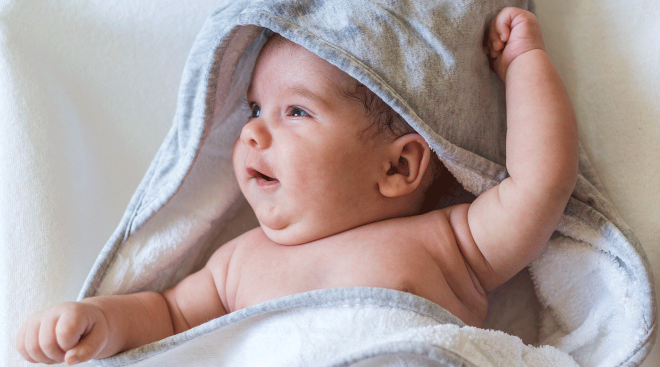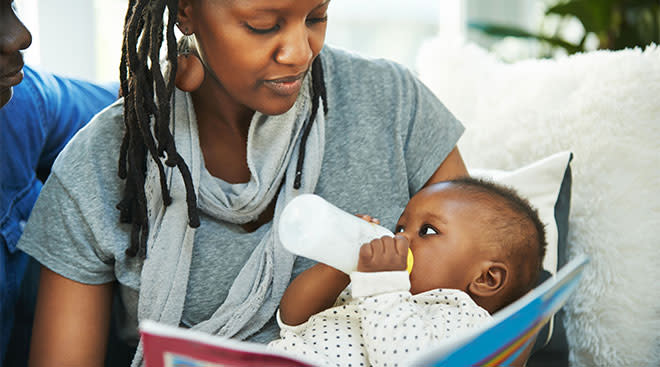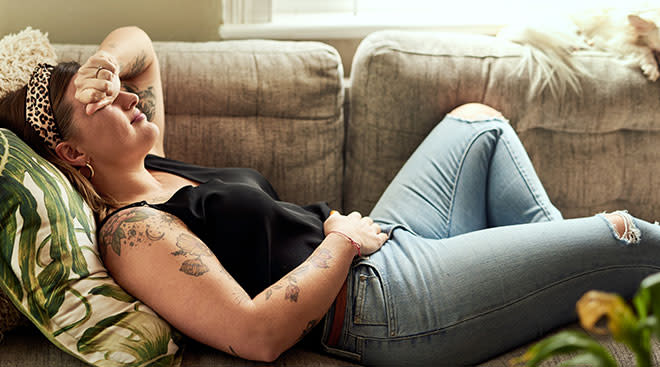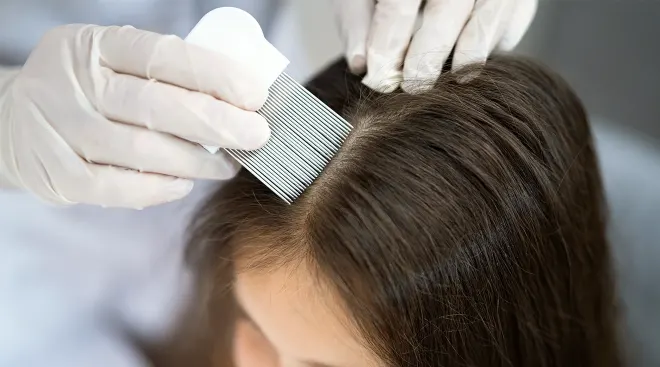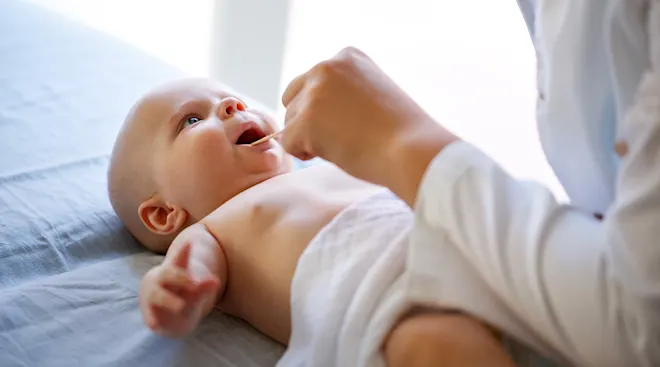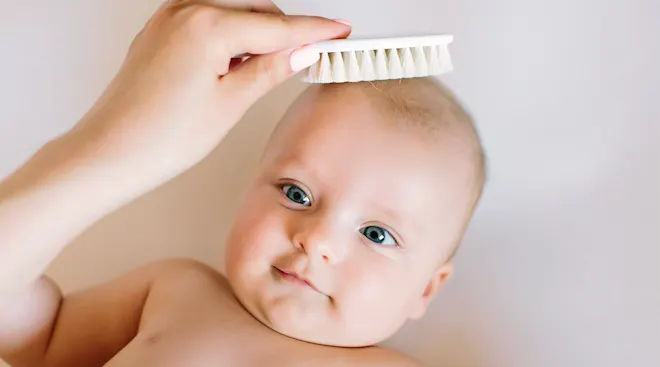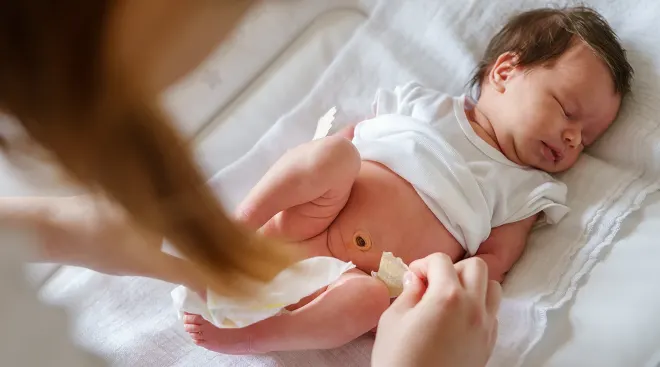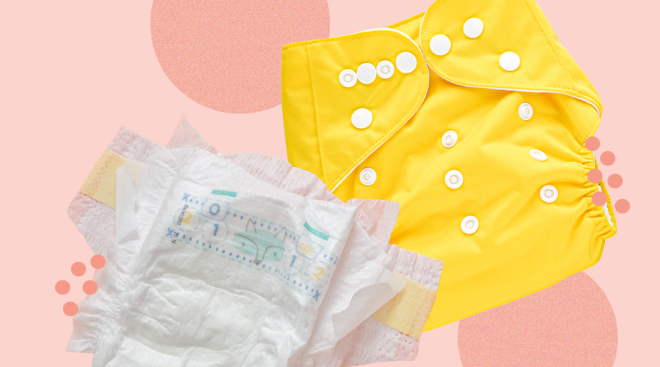Why Babies Get Hiccups (and How to Get Rid of Them)
From little coos to tiny yawns, babies do the most adorable things, but sometimes it’s hard to know if what they’re doing is a normal part of development. When your infant hiccups, it can sound cute and sweet, but you might be wondering—is it normal?
The short answer is yes. Baby and newborn hiccups are completely harmless and just one sign of baby’s growth and development. “Hiccups, which occur in the gastrointestinal tract, almost never indicate a problem in newborns or infants,” says Christal-Joy Forgenie, MD, a pediatrician with Soha Pediatrics in New York City. Still, they can be a little disturbing for you and your sweetheart. Wondering how to get rid of baby hiccups? Read on to learn possible causes and how long episodes may last—plus, how to stop baby hiccups or, better yet, prevent them altogether.
Just like in adults, infant hiccups are caused by spasms of baby’s tiny and developing diaphragm, the large muscle that runs across the bottom of the rib cage and moves up and down as we breathe. Though nobody knows for sure why we hiccup (it doesn’t seem to have any obvious, useful purpose), these spasms can be triggered by many things.
Newborn hiccups are most frequently caused by baby overfeeding, eating too quickly or swallowing a lot of air. “Any of these things can lead to stomach distention,” Forgenie says. When the stomach distends it actually pushes against the diaphragm, which causes it to spasm, and voilà—hiccups! Forgenie adds that it’s very common for newborn hiccups to set in after or even during a feeding.
Suffice to say, if baby starts hiccuping as you’re trying to offer more boob or bottle, consider it a hint to take a breather. Some experts believe baby hiccups can be the result of food and acid rising up from the stomach when baby is full. Baby hiccups can also be related to overeating or eating too quickly. To that end, you may be able prevent hiccups by feeding baby slowly and taking breaks for burping.
Baby hiccups can also be the result of sudden changes in stomach temperature. Say, for example, you give baby some cold milk and then a few minutes later feed them some warm rice cereal. According to Forgenie, this combination can actually trigger those baby hiccups.
In addition to feeding-related triggers, once in a while, a case of constant baby or newborn hiccups can be caused by something entirely different. The culprit is usually gastroesophageal reflux, or GERD as it’s often called. When baby suffers from gastroesophageal reflux disease, partially digested food and acidic juices from the stomach flow back up into the esophagus causing burning and discomfort. Since the esophagus passes through the diaphragm, it can get irritated and lead to lots of baby hiccups. “It sounds intense, but it’s quite common and doesn’t always create problems for babies,” Forgenie says.
It’s important to note that hiccupping in and of itself isn’t a sign of reflux. Here are some other clues to look out for that could mean GERD:
- Baby is crying more frequently
- Baby arches their back excessively during or after regular feedings
- Baby is spitting up more than normal
If you notice several of these symptoms and suspect those baby or newborn hiccups may be due to gastroesophageal reflux, speak to your pediatrician. The good news is the condition is easily treated.
Babies can have hiccups multiple times a day, lasting for 10 minutes or longer. As a general rule, if baby acts happy and doesn’t seem uncomfortable, baby hiccups aren’t a cause for concern. “It can be worrisome, especially for new moms and dads, but hiccups tend to go away after a few minutes,” says Robin Jacobson, MD, a clinical assistant professor of pediatrics at Hassenfeld Children’s Hospital at NYU Langone in New York City. You can just wait it out and allow the hiccups to resolve on their own. If the hiccups persist and seem to be causing baby distress, call your pediatrician to figure out the cause.
Can you put baby down with hiccups?
In most cases, it’s totally fine to put baby on their back when they have hiccups; those little diaphragm spasms don’t interfere with breathing so there’s no physical or medical reason not to. Of course, as you know, hiccups can be a pesky nuisance, and baby may find having a case annoying, disruptive or mildly uncomfortable, in which case, you may want to hold them upright until the hiccuping subsides.
That said, babies who are hiccuping as a result of reflux may be prone to vomiting; if your little one seems to be having a painful GER episode, try keeping them upright. It’s always best to consult with your doctor if you have concerns.
Now that you know why they can happen, you’re probably wondering: How do you get rid of baby hiccups? Even if baby hiccups are almost always harmless, it’s normal for you to want your child to get some relief from those incessant spasms. With that in mind, we’ve rounded up the top tips for how to stop baby hiccups. (Hint: It has a lot to do with burping!)
Generally, if it seems baby or newborn hiccups are related to overfeeding, belly distention or reflux, “you can help alleviate hiccups by feeding baby smaller amounts more often, and remember to burp baby frequently,” says Karen Fratantoni, MD, MPH, a pediatrician at Children’s National Health System.
How to stop baby hiccups in breastfed babies
When offering baby your breast, be sure to mind these tips to help curb hiccups:
- Burp baby as you switch from one breast to the other.
- If swallowing air seems to be the main issue, it’s a good idea to reevaluate the latch. Make sure baby’s lips are sealed around the areola of your breast, not just the nipple.
How to stop baby hiccups in bottle-fed babies
Giving your little one a bottle? Here’s how to get rid of any resulting baby hiccups:
- Forgenie recommends stopping halfway through a bottle to burp baby and then complete the feeding after a 5- to 10-minute break. “Completing the feeding while baby is relaxed can actually end the hiccupping,” she says.
- Try repositioning the bottle so the air isn’t near the nipple, but is instead at the bottom of the bottle.
How to stop baby hiccups for bottle-fed or breastfed babies
Regardless of whether you’re giving baby the bottle or the breast, these tips can help to stop baby hiccups:
- Sit baby upright for 20 to 30 minutes after each feeding.
- If there’s no identifiable cause of the hiccups, rubbing baby’s back or rocking them can also help.
What not to do for baby hiccups
While there are several ways to try and stop baby hiccups, there are a few things that should be avoided altogether:
- Never startle or scare baby to combat hiccups. “Really, none of that stuff works,” Jacobson says.
- Don’t put a wet cloth on their forehead, which doesn’t help either.
- Holding one’s breath is one remedy that should never be attempted on baby. It’s dangerous, plain and simple.
- Many people recommend pulling on baby’s tongue and pressing on their forehead or anterior fontanelle (the soft part of baby’s head), Forgenie says, but this can hurt baby. “Overall, the best thing to do is to wait it out and rest assured that the hiccups will resolve on their own,” she says.
Of course, you may want to try a few tricks to prevent baby hiccups from happening in the first place. While there’s no guaranteed way to ward off hiccups, here are a few prevention tips to keep in mind:
- The key to preventing baby hiccups is to avoid overfeeding, Jacobson says. Take breaks during feedings to burp baby so the stomach doesn’t fill too much, too quickly.
- For bottle-fed babies, make sure to tip the bottle while feeding to limit the amount of air baby swallows.
- “Holding baby up for a few minutes after feedings before putting them down can help prevent baby hiccups,” Jacobson says, since how you position baby can impact any reflux.
Baby hiccups tend to happen less frequently as kids mature. “Usually by 6 months hiccups decrease a bit, but it’s not worrisome if, say, a baby of 9 months has the hiccups,” Jacobson says.
At the end of the day, remember that baby or newborn hiccups are rarely a cause for concern. “They’re a very common, benign occurrence in infants,” Fratantoni says. “You can try these remedies or just wait it out—they’re normal and will go away on their own.”
Yes, some infants are just prone to frequent hiccuping; in fact, plenty of babies get them in the womb too! (If you ever felt your bump jump in a rhythmic pattern, baby hiccups were likely the culprit!) Hiccups can be a minor disturbance, but that doesn’t mean they’re harmful. Nevertheless, if baby doesn’t stop hiccuping after a long period of time, don’t hesitate to contact your pediatrician. In the meantime, if your infant has the occasional episode here or there, try to worry less and enjoy the adorable little high-pitched sound while it lasts…
Please note: The Bump and the materials and information it contains are not intended to, and do not constitute, medical or other health advice or diagnosis and should not be used as such. You should always consult with a qualified physician or health professional about your specific circumstances.
Plus, more from The Bump:
Christal-Joy Forgenie, MD, is a pediatrician with SoHa Pediatrics in New York City. Before joining SoHa, Forgenie worked at Montefiore Medical Center and then went on to work in private practice in Washington Heights. She earned her medical degree from Stonybrook University School of Medicine in New York.
Karen Fratantoni, MD, MPH, is a pediatrician at Children’s National Health System and the medical director of the Complex Care Program. She earned her medical degree from Eastern Virginia Medical School.
Robin Jacobson, MD, is a pediatrician and clinical assistant professor of pediatrics at Hassenfeld Children’s Hospital at NYU Langone in New York City. She earned her medical degree from Tufts University.
Learn how we ensure the accuracy of our content through our editorial and medical review process.
Navigate forward to interact with the calendar and select a date. Press the question mark key to get the keyboard shortcuts for changing dates.
































